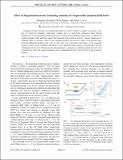Effect of Magnetization on the Tunneling Anomaly in Compressible Quantum Hall States
Author(s)
Chowdhury, Debanjan; Skinner, Brian J; Lee, Patrick A
DownloadPhysRevLett.120.266601.pdf (320.4Kb)
PUBLISHER_POLICY
Publisher Policy
Article is made available in accordance with the publisher's policy and may be subject to US copyright law. Please refer to the publisher's site for terms of use.
Terms of use
Metadata
Show full item recordAbstract
Tunneling of electrons into a two-dimensional electron system is known to exhibit an anomaly at low bias, in which the tunneling conductance vanishes due to a many-body interaction effect. Recent experiments have measured this anomaly between two copies of the half-filled Landau level as a function of in-plane magnetic field, and they suggest that increasing spin polarization drives a deeper suppression of tunneling. Here, we present a theory of the tunneling anomaly between two copies of the partially spin-polarized Halperin-Lee-Read state, and we show that the conventional description of the tunneling anomaly, based on the Coulomb self-energy of the injected charge packet, is inconsistent with the experimental observation. We propose that the experiment is operating in a different regime, not previously considered, in which the charge-spreading action is determined by the compressibility of the composite fermions.
Date issued
2018-06Department
Massachusetts Institute of Technology. Department of Physics; Massachusetts Institute of Technology. Research Laboratory of ElectronicsJournal
Physical Review Letters
Publisher
American Physical Society
Citation
Chowdhury, Debanjan et al. "Effect of Magnetization on the Tunneling Anomaly in Compressible Quantum Hall States." Physical Review Letters 120, 26 (June 2018): 266601 © 2018 American Physical Society
Version: Final published version
ISSN
0031-9007
1079-7114